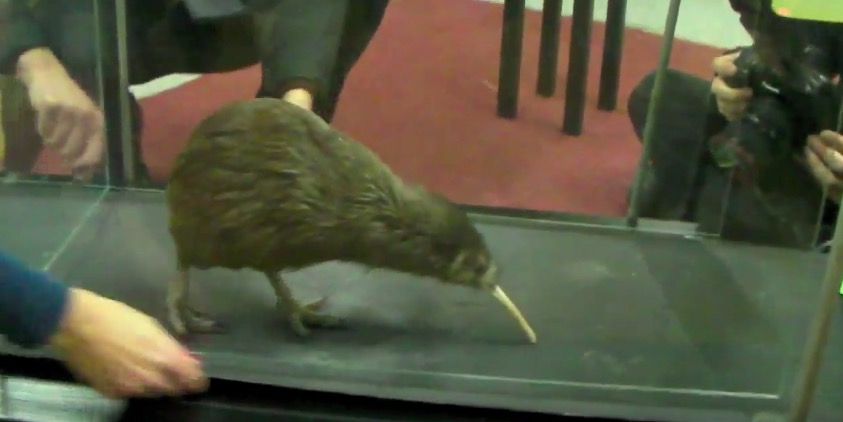
Cute
Even Kiwi Birds Have to Exercise
For the New Zealand Kiwi, getting stuck in bad situations tends to be a common occurrence. At least that’s what happened to Ruata. The bird is one of a species known as the North Island Brown Kiwi, and it is unique to the location it is named after. In Ruata’s case, his leg had been stuck in a trap, causing a dislocation as the bird had tried to free himself. With care from a vet, Ruata was healed, but he still had to recuperate before being released again.
The typical approach for a human recovering from serious surgery or medical procedure tends to be rehabilitation. The same actually applies to birds, like Ruata. The Wildbase Center at Massey University is the key facility for avian patients, specifically the wildlife variety. In many cases, staff there have to construct specific environments for the patients, similar to the natural conditions, that trigger exercise and recuperation on the natural with normal activities the birds are used to. Ruata was placed in a similar containment that originally helped another Kiwi recover back in 2010.
The effort is important; some 25,000 Northern Island Brown Kiwis are left, with the number decreasing over the last few years. So, helping strong adults recover from injuries helps keep numbers stabilized instead of losing more that can breed and add replacements in the wild with new young. Traps, however, are not a big risk for these Kiwi birds. Unlike Ruata, the biggest risk for the birds today tends to be other animals, particularly domesticated cats and dogs.
Prior to people arriving, Kiwis in general have lived on New Zealand for probably 70 million or more years. When humans arrived and settled the area, they eventually began to introduce domestic pets like cats and dogs and even rats and ferrets, especially with the arrival of Europeans to the area. All of these creatures are practically a death sentence for the Kiwi, which lives on the ground primarily. Kiwis simply aren’t fast enough to get away, and their nests are easy to find and smash for a quick snack by a hungry dog or ferret.
Of the Kiwi chicks born every year, more than 9 out of 10 are killed before adulthood, mainly due to domestic animals killing half of them. Leg-traps are common to keep prowling animals out of areas with Kiwis, but in Ruata’s case, the bird might have ended up becoming an unintended victim. Fortunately, the Wildbase Center is available to help, with an 80 percent success rate in cases it takes on. At the same time, the Center also gets a chance to add to Kiwi research, being able to observe their behavior as they recuperate. So, the benefit is two-fold.
Cute
Five-Year-Old Draws 99 Animals for Sir David Attenborough’s 99th Birthday
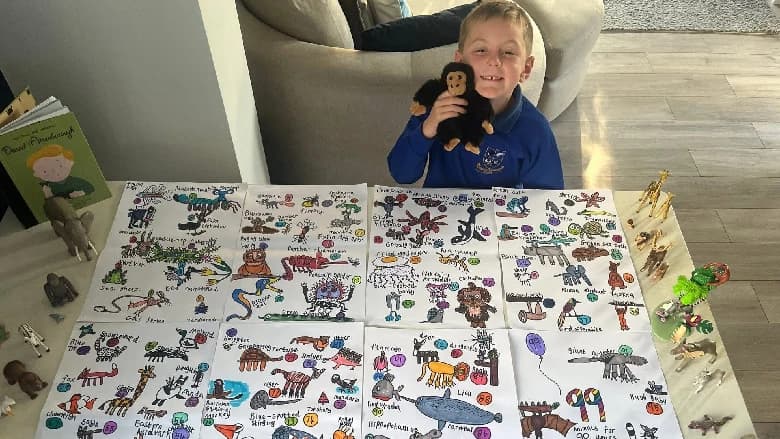
When Max Evans-Browning learned that Sir David Attenborough was turning 99, he knew exactly how he wanted to celebrate: by drawing 99 of his favorite animals.
The five-year-old from Pembrokeshire, Wales, has adored the legendary broadcaster and biologist for as long as he could talk, according to his mother, Samantha. “His bedroom is animals. He watches animals, reads about animals—he lives and breathes them,” she said.
Over four days, Max carefully illustrated 99 creatures across eight A3 sheets of paper, spending each evening after school working on his tribute. With help from his mum, Max researched Sir David’s most-loved animals to make the drawings as special as possible. The final result is part birthday card, part wildlife encyclopedia—drawn entirely by a passionate young fan.
To help make her son’s dream come true, Samantha posted the drawings on Facebook, asking for help in getting the card into Sir David’s hands. The post quickly gained traction, with hundreds of shares and supportive comments pouring in from around the world. “Max is fascinated people in Australia could see the post,” she said.
Max’s admiration for Attenborough runs deep. At just three years old, he dressed as him for World Book Day. He also regularly goes litter picking and is especially concerned about plastic pollution in the ocean. When watching nature documentaries, he isn’t upset by tough scenes. Instead, he calmly explains, “Well, a predator goes after its prey—that’s life.”
Samantha says her son has watched all of Attenborough’s documentaries and owns more animal encyclopedias than she can count. “He’ll name a pangolin like it’s the most obvious thing in the world,” she said.
While the online attention has been exciting, Max has only one wish: that his drawings reach Sir David. His birthday message is simple:
“Happy Birthday from Max Evans-Browning, age 5, from Pembrokeshire.”
And thanks to the power of social media—and a whole lot of heart—there’s a chance it just might.
Cute
Tiny Kitten Cries with Gratitude After Realizing She’s Finally Safe and Loved
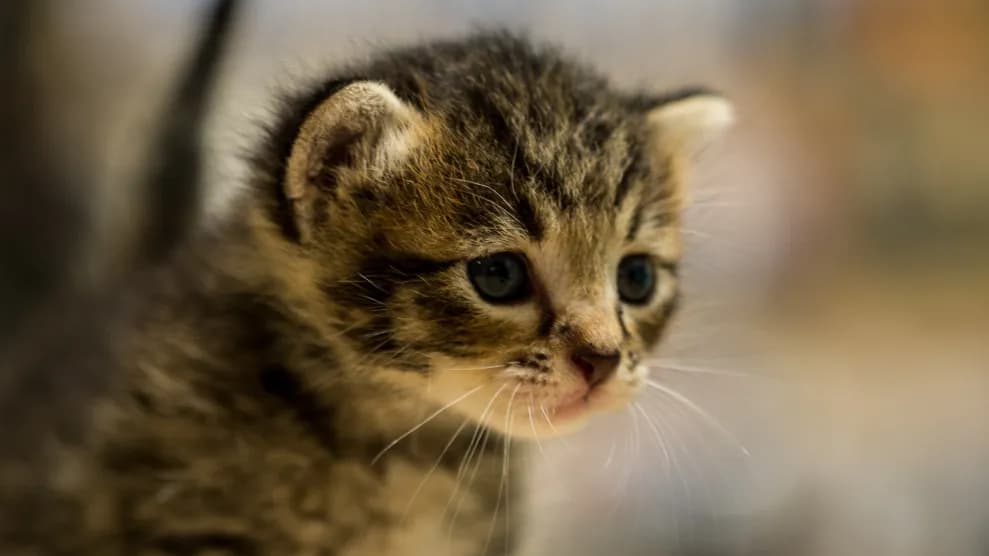
There’s nothing quite like finding a place to call home—and for one tiny kitten, the moment she realized she was finally safe brought her to tears. Literally.
In a heart-melting TikTok video posted by WCJC Animal Shelter (@wcjcanimalshelter), a small kitten is seen crying softly after being rescued and taken in by a loving forever family. Her little meows of relief and joy have captured the internet’s attention, as viewers are moved by the pure emotion of the moment.
As the shelter put it: “The minute you realize you have been rescued and are safe now.”
The video shows the kitten gently nibbling on food, already more relaxed and comforted knowing that she’s finally out of the shelter and headed into a new life filled with love.
One viewer summed it up perfectly in the comments: “Thank you so much for saving this beautiful precious little fur baby. So cute and little.”
While this sweet story has a happy ending, many cats are still waiting in shelters for their own second chance. According to the American Society for the Prevention of Cruelty to Animals (ASPCA), roughly 3.2 million cats enter shelters in the U.S. every year. Of those, about 2.1 million are adopted, but hundreds of thousands remain in shelters or face euthanasia due to overcrowding and lack of resources.
Shelters do their best to provide care, food, and medical attention, but they can be stressful environments, especially for kittens and more sensitive animals. Constant noise, unfamiliar smells, and the coming and going of other animals can leave pets anxious and withdrawn. That’s why adoption makes such a powerful difference—it doesn’t just give an animal a home, it gives them peace.
Stories like this one are a reminder of the difference a little love can make. When you adopt, foster, or support your local animal shelter, you’re helping transform fear into trust, and loneliness into family.
And sometimes, if you listen closely, you might even hear a tiny thank-you meow.
Cute
Heartwarming Footage Captures Polar Bear Cub Cuddling with Mother in Canadian Wilderness
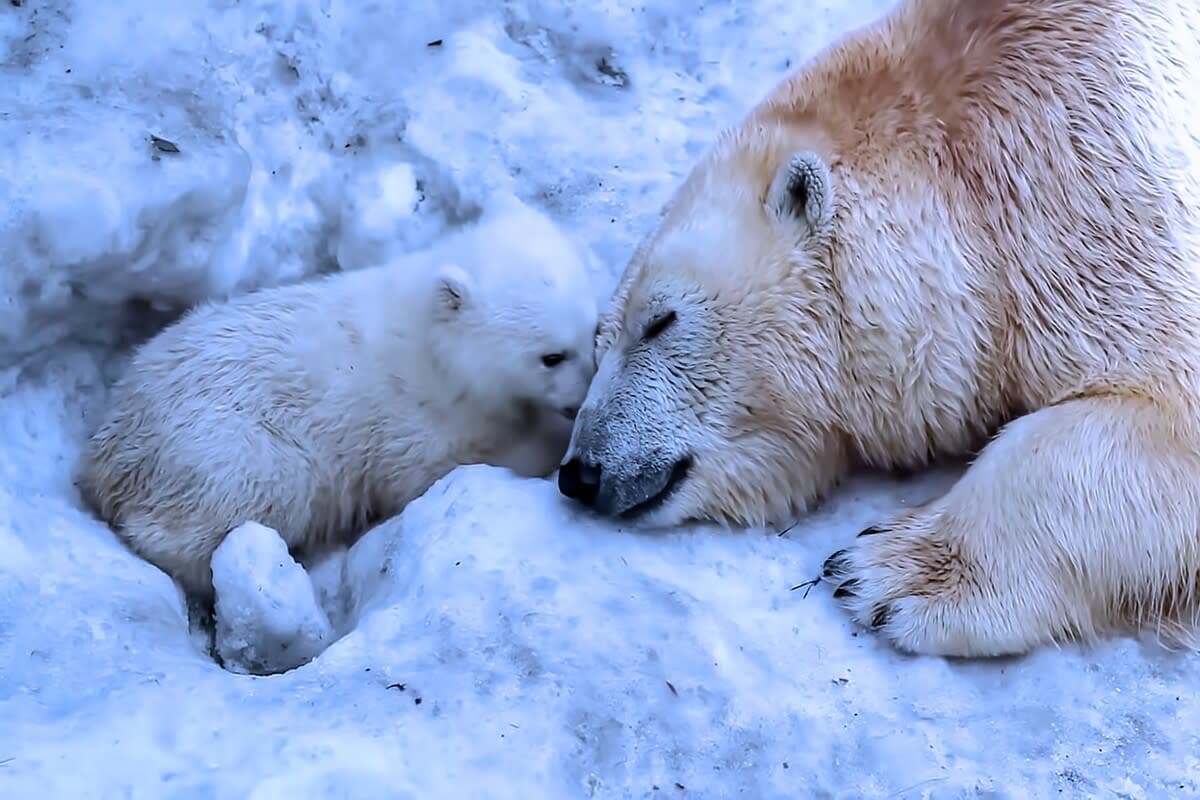
In the vast, frozen landscapes of Canada’s Wapusk National Park, a rare and touching moment between a polar bear mother and her cub was captured on film by tour guide Drew Hamilton. The video, which has melted hearts worldwide, showcases the deep bond between a mother polar bear and her young cub as they cuddle and play in the snow.
Hamilton, who had to obtain a special permit to observe polar bears in their natural habitat, explained that this time of year is ideal for witnessing these interactions. As spring approaches, mother bears emerge from their dens with their cubs, preparing them for the journey ahead.
The Early Days of a Polar Bear Cub
Polar bear cubs are typically born around December in the safety of a snow den, where they stay for several months to gain strength. By spring, they are ready to venture out with their mother, who will guide them to the sea ice—a crucial step in their survival.
During this time, the mother bear teaches her cub how to hunt and navigate the icy environment. Cubs rely on their mother’s rich, fatty milk and small portions of seal blubber as they grow. This period of learning lasts for two to three years, after which the cub must survive on its own.
A Moment of Pure Affection
The video captures an endearing moment as the cub clambers over its mother, snuggling into her fur. Viewers in the comments section expressed overwhelming joy, calling the scene “cuteness overload.” Many noted that these rare glimpses into nature’s tenderness are the kind of uplifting news they love to see.
As Hamilton pointed out, this young cub is likely still nursing and experiencing the first stages of its development. Soon, it will follow its mother onto the ice, where its survival instincts will begin to take shape.
The Journey Ahead
For now, this polar bear family is enjoying precious moments together before embarking on the long trek toward the sea ice. The footage serves as a beautiful reminder of the natural world’s wonders and the importance of protecting the fragile Arctic ecosystem that these majestic creatures call home.
As climate change continues to impact polar bear habitats, capturing and sharing these moments becomes even more essential. They remind us of the delicate balance of life in the Arctic and the resilience of these incredible animals.
Cute
Man Proposes After Finding Engagement Ring in Ashes of Home Destroyed by LA Wildfires

In a moment of hope amid devastation, a California man surprised his girlfriend with an impromptu proposal after uncovering the engagement ring he feared had been lost in the Los Angeles wildfires.
Brian McShea and Stephanie Raynor returned to the site of their Altadena home, which had been destroyed by the Eaton Fire, to see if anything had survived the inferno. The wildfire, part of a series of destructive blazes across Los Angeles County, burned more than 14,000 acres, destroyed over 16,000 structures, and claimed at least 28 lives.
McShea, who had hidden the ring in a desk drawer before the fire, was determined to search through the rubble despite low expectations. “I thought the ring was going to completely disintegrate,” he admitted. Yet, as they sifted through the ashes, brushing away debris, McShea spotted the glimmer of a diamond.
The discovery shifted McShea’s plans for a future proposal into an immediate act of love. Kneeling amid the ruins, dressed in protective gear, he asked Raynor to marry him. “I’m crying,” Raynor recalled of the emotional moment.
Though their home is gone, the couple is resolute in their commitment to rebuild their lives together. “We’re really hoping that Los Angeles can support Altadena in its rebuild effort for the next couple years,” McShea said.
The proposal and their resilience offer a poignant reminder of the human spirit’s ability to find love and hope even in the ashes of loss. The couple has yet to set a wedding date but plans to remain in the area as they start anew.
Meanwhile, Southern California has seen much-needed rainfall, bringing relief to fire-scarred landscapes but raising concerns about mudslides. Emergency crews are working to prevent flash floods in affected areas as the region faces the challenges of recovery.
Cute
Backpacks of Care: Vancouver Volunteers Bring Hope to Homeless Youth
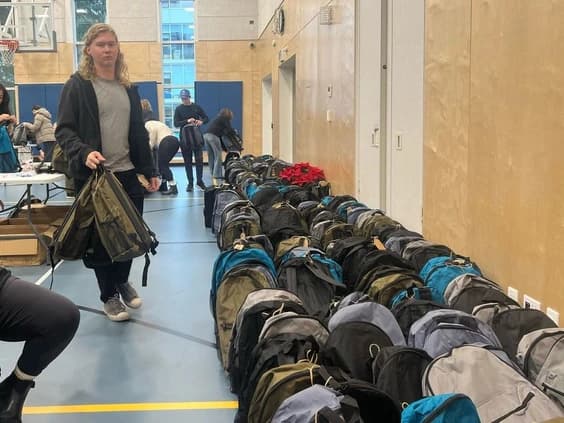
Volunteers gathered in Vancouver on Saturday morning to help brighten the holidays for homeless youth. The annual Backpacks of Hope initiative, led by Covenant House, provides gifts for 350 young people, ages 16 to 24, who use the non-profit’s residential housing and drop-in programs.
“This is like the community is wrapping the youth with a hug for the holidays,” said Amanda Merler, manager of volunteer services at Covenant House. “Getting these backpacks shows them there are people out looking to support them.”
Giving Back: A Volunteer’s Story
Among the 50 volunteers was Andrew Teel, a 22-year-old who spent part of his childhood in foster care.
“I could have been one of those youths,” Teel said. Born with fetal alcohol syndrome, Teel now works in a restaurant and is part of an adoptive family. “I wanted to help youth who might not have had the opportunity I have now—a family that cares about you and a safe place.”
Teel first volunteered at 13 and continues to return every year with his adoptive family.
Thoughtful Gifts for the Season
Each backpack contains practical and comforting items, including:
- Warm clothing like socks and toques
- Toiletries and first aid kits
- Chocolates for the holidays
- Journals for reflection
“All of our residents wake up on Christmas morning to find a backpack under the tree with staff all gathered around, just like a traditional family,” Merler said.
Community Collaboration
The initiative relies on support from 35 groups—corporate teams, schools, and individuals—who help bundle and deliver the backpacks.
Covenant House continues to face fundraising challenges, particularly with mail delays impacting donations. To support the initiative, donations can be made at covenanthousebc.org or by calling 604-638-4438.
For Vancouver’s homeless youth, this effort serves as a reminder that they are not alone. The backpacks offer more than supplies—they bring warmth, care, and hope during a difficult time of year.
-

 OMG7 years ago
OMG7 years agoA Couple Gave Birth to the Most Beautiful Twins Ever
-

 OMG8 years ago
OMG8 years ago20 Rare Historical Photos
-

 OMG7 years ago
OMG7 years agoHilarious Airport Photos
-

 Cute7 years ago
Cute7 years agoMom Refuses to Let Daughter Eat Sugar and Years Later This is What She Grows Into
-

 OMG7 years ago
OMG7 years agoTop Secret Air Force One Facts That You Never Knew
-
OMG7 years ago
The Funniest Yearbook Photos Of All Time
-

 OMG7 years ago
OMG7 years agoRetired Mathematician Restores Log Cabin
-

 OMG6 years ago
OMG6 years agoWhat Happened When This ‘Duck Dynasty’ Legend Chopped Off His Beard?